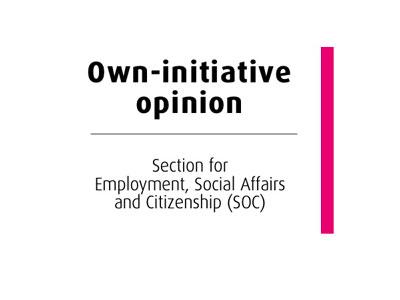European Economic
and Social Committee
Loss of Purchasing Power, Inequalities, Exclusion and Marginalisation
Background
This EESC own-initiative opinion addresses the growing risks of inequality, exclusion, and marginalisation linked to the ongoing cost-of-living crisis. This opinion is part of a broader package of EESC work examining the multifaceted impacts of the crisis and proposing coordinated responses across policy areas. It complements an umbrella opinion and six other sectoral opinions.
Key points
The EESC:
- considers that investment in people and the economy, fair taxation, quality and affordable public services, and targeted support for the most vulnerable—alongside both short- and long-term industrial policy and efforts to boost competitiveness—are essential to mitigating the cost-of-living crisis and protecting against future shocks;
- recommends a stronger use of social dialogue, collective bargaining, and civil dialogue to address labour market challenges and improve wages and social protection for workers, in alignment with productivity developments;
- acknowledges the importance of wage and minimum wage increases, and highlights the positive impact of the Adequate Minimum Wage Directive in driving wage growth;
- believes the EU must enhance its capacity to prevent and respond to future crises, including by adopting a permanent financial instrument to stabilise Member States' expenditures in the face of external economic shocks. It also recommends the adoption of appropriate pricing policies, such as energy price caps, along with the implementation of affordable housing policies by Member States and a comprehensive European strategy to combat homelessness;
- underlines the role of education as a powerful preventive tool against exclusion, marginalisation, and inequality, and calls on the EU and Member States to increase investment in this area;
- believes that essential and social services, including those provided by social economy entities, should be developed in a way that eliminates barriers to access;
- emphasises the need to strengthen the use of distributional impact assessments within the European Semester and its Social Convergence Framework to ensure that policies in all areas do not exacerbate poverty or inequality;
- urges the EU to encourage Member States to maintain adequate public spending on social security systems, education, training, healthcare, and community care.
Additional information
EESC section: Employment, Social Affairs and Citizenship (SOC)
Opinion type: Own-initiative opinion
Rapporteur: Maria del Carmen BARRERA CHAMORRO
Reference: SOC/823-EESC
Date of adoption by section: 22/5/2025
Contact:
Valeria Atzori / Gabriela Grasu, Administrators
Email: soc@eesc.europa.eu
